
The results from the 2024 Physical Activity and Sport Survey by Leger, in collaboration with the Canadian Fitness and Lifestyle Research Institute (CFLRI), found that most Canadians perceived sport, physical activity and recreation opportunities to be fair, respectful, ethical (71%) and safe (72%) to a moderate or great extent. Table 1 further describes the findings from this survey.
Table 1: Perceptions about physical activity and sport opportunities available in the community
| Not at all or a little | Somewhat | Moderate to great extent | |
| Affordable | 35% | 26% | 39% |
| Accessible | 22% | 27% | 51% |
| Convenient | 18% | 25% | 57% |
| Available (e.g., facilities nearby) | 17% | 22% | 61% |
| Welcoming, inclusive | 16% | 23% | 61% |
| Fair, respectful, ethical | 9% | 21% | 71% |
| Safe (e.g., free from crime or bullying, physically safe) | 9% | 19% | 72% |
Source: 2024 Physical Activity and Sport Survey, Leger with CFLRI
Gender differences in perceptions about physical activity and sport opportunities were evident. Overall, men were more likely than women to have strong positive perceptions about available opportunities.
When asked to indicate to what extent to which they felt physical activity and sport opportunities were affordable, accessible, convenient, available, welcoming and inclusive, fair, respectful, equitable and safe, a greater percentage of men agreed to this to a moderate or great extent compared to women. More women than men, however, indicated that physical activity and sport opportunities were ‘not at all or a little’ welcoming and inclusive, accessible, convenient and affordable.
These gender differences in perceptions were apparent among certain age groups. For example, a greater percentage of men between the ages of 25 and 44 compared to women the same age agreed that physical activity opportunities were fair, respectful, ethical, welcoming and inclusive, accessible, and convenient to a moderate or great extent. The gender difference in the percentage agreeing to a moderate or great extent that opportunities were available was only significant among adults aged 65 years and older, whereas the difference between men and women agreeing to a moderate or great extent that opportunities were affordable was significant among all age groups.
Figure 1: Perceptions about sport, physical activity and recreation by gender
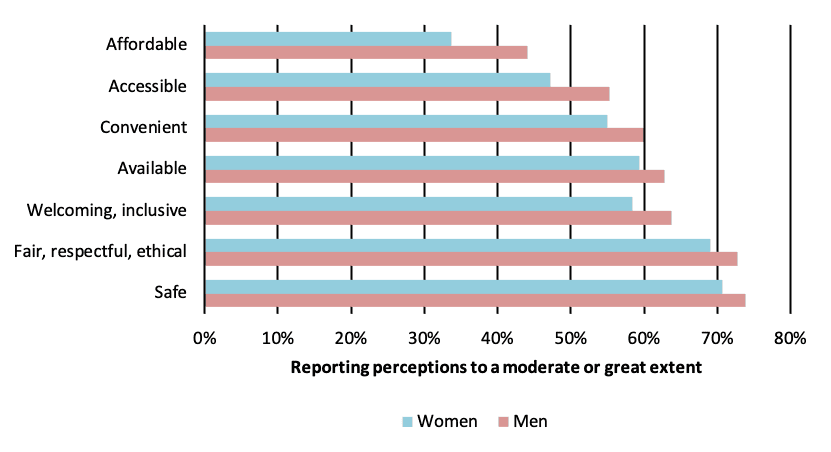
Source: 2024 Physical Activity and Sport Survey, Leger with CFLRI
Canadians’ perceptions regarding physical activity, sport and recreation opportunities were associated with age. A greater percentage of older adults hold strong positive perceptions about opportunities compared to younger adults.
A greater percentage of adults aged 65 years and older reported physical activity and sport opportunities as safe, welcoming and inclusive, convenient, and affordable to a moderate or great extent compared to those who were younger. Young adults between the ages of 18 and 24 were least likely to say that sport and physical was accessible to a moderate or great extent.
Figure 2: Perceptions about sport, physical activity and recreation by age
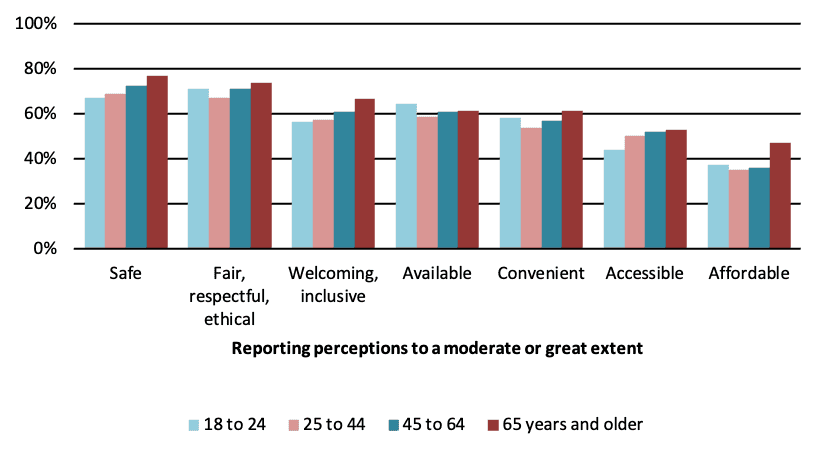
Source: 2024 Physical Activity and Sport Survey, Leger with CFLRI
Strong positive perceptions about the opportunities for physical activity and sport varied by socio-economic status, particularly by measures of education level and household income.
There were distinct differences in relation to perceptions about opportunities and education level. Specifically, a higher percentage of adults with a university education indicated that opportunities were safe, fair, respectful, ethical, welcoming and inclusive, available, and affordable to a moderate or great extent compared to those with a college level education or less. There were no significant differences, however, by education level in the percentage of individuals who agree to a moderate or great extent that physical activity and sport opportunities were accessible.
More adults living in the highest income households (≥$100,000/year) indicated that the physical activity, sport and recreation opportunities were safe, fair, respectful, and ethical, welcoming and inclusive, available, accessible, convenient or affordable to a moderate or great extent compared to individuals living in lower income households.
Figure 3: Perceptions about sport, physical activity and recreation by household income
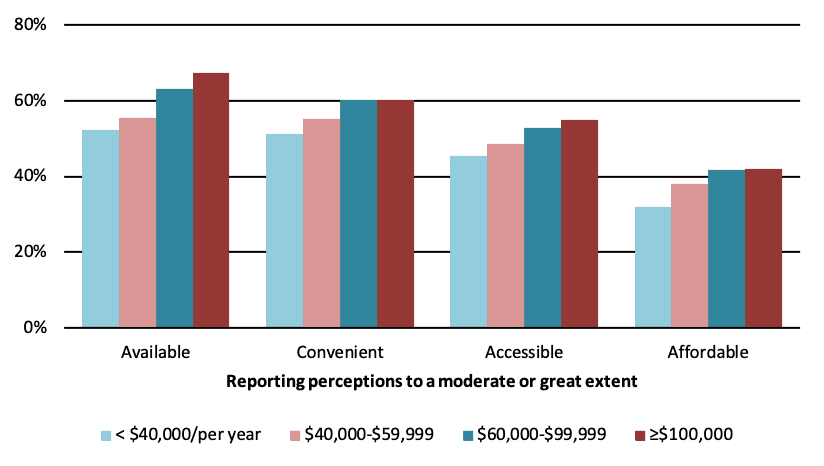
Source: 2024 Physical Activity and Sport Survey, Leger with CFLRI
The presence of a disability significantly impacted the extent to which adults reported strong positive perceptions about available opportunities.
Compared to adults without a disability, fewer adults with a disability viewed physical activity, sport and recreation opportunities as safe, fair, respectful and ethical, welcoming and inclusive, available, accessible, convenient and affordable to a moderate or great extent.
Figure 4: Perceptions about sport, physical activity and recreation by disability status
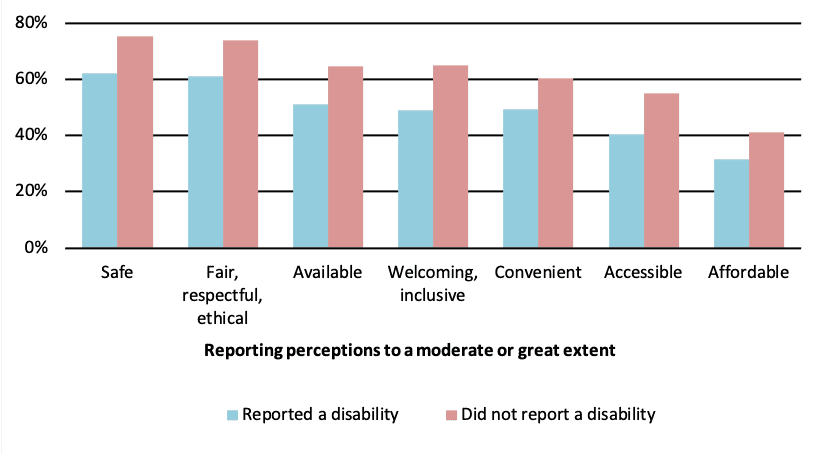
Source: 2024 Physical Activity and Sport Survey, Leger with CFLRI
Canadians living in rural and small communities were least likely to have positive perceptions about the physical activity and sport opportunities in the community, whereas a higher percentage of adults living in Quebec perceived opportunities favorably.
Relatively fewer adults living in rural communities or communities with less than 10,000 residents felt that physical activity, sport, and recreation opportunities were available, accessible or convenient to a moderate or great extent, compared to adults from urban or suburban communities and communities with 10,000 residents or more, respectively. On the contrary, adults living in urban environments were significantly less likely than those from suburban communities to perceive opportunities as safe to a moderate or great extent. There were no significant differences by location or community size, in the percentage of adults that agreed to a moderate or great that opportunities were fair, respectful, and ethical, welcoming and inclusive, or affordable.
Figure 5: Perceptions about sport, physical activity and recreation by geographical location
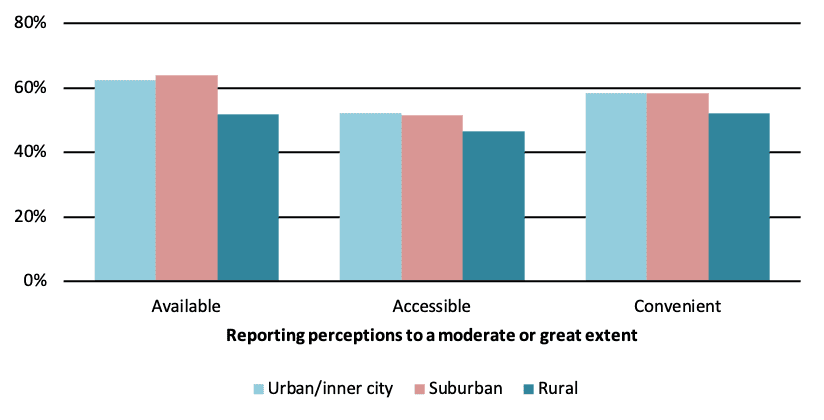
Source: 2024 Physical Activity and Sport Survey, Leger with CFLRI
Compared to Canadians overall, a higher percentage of those from Quebec agreed to a moderate or great extent that opportunities were fair, respectful, and ethical, welcoming and inclusive, available, convenient and affordable. On the other hand, fewer residents living in Alberta and Saskatchewan indicated that available opportunities were affordable while residents in Saskatchewan were also less likely than the average to agree they were fair, respectful and ethical to a moderate or great extent.
Figure 6: Perceptions about sport, physical activity and recreation by region*
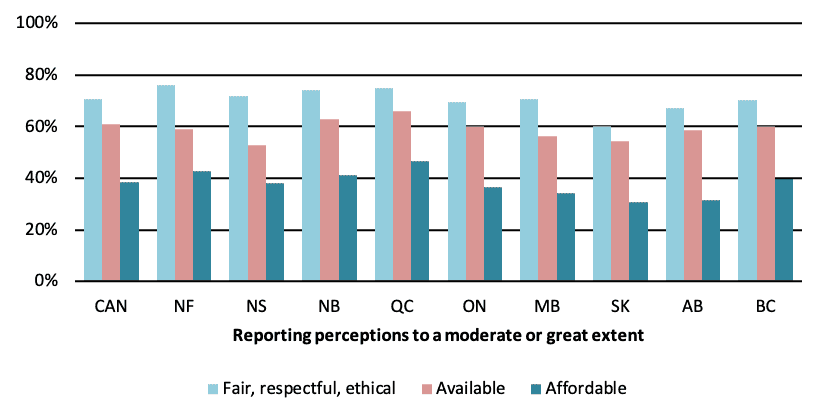
Source: 2024 Physical Activity and Sport Survey, Leger with CFLRI
*PE, YK, NT, NU not available due to sample size
Canadians’ perceptions about physical activity opportunities differed slightly based on location of birth.
Perceptions about safety, accessibility and affordability varied between individuals who were born elsewhere and those born in Canada. Specifically, a lower percentage of individuals who were born elsewhere reported physical activity, sport and recreation opportunities as safe, whereas relatively more agreed that they were accessible or affordable to a moderate or great extent compared to those born in Canada. There were generally no significant differences in perceptions by length of time living in the country, with one notable exception. Adults who have lived in the country for over 15 years were more likely than Canadians who lived in the country for a shorter period of time to view opportunities as safe.
Production of this summary has been made possible through a financial contribution from the Government of Canada. The views expressed herein do not necessarily represent their views.


